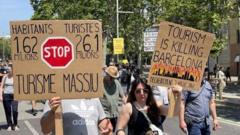As Spain initiates strict data regulations aimed at enhancing national security, the hospitality sector expresses apprehension over potential operational disruptions and privacy issues.
Spain Implements New Data Regulations for Tourists, Causing Check-In Concerns

Spain Implements New Data Regulations for Tourists, Causing Check-In Concerns
Starting Monday, new requirements for tourists in Spain prompt fears over check-in delays due to extensive personal data collection.
Spain is set to roll out a new law on Monday that mandates hotel owners, car rental companies, and other accommodation providers to submit personal information of their guests to the government. This requirement, which also encompasses rental properties and campsites, is being enforced under the auspices of national security. However, tourism professionals are voicing their concerns about privacy implications, anticipating that these measures could result in significant delays at check-in counters.
Under the new Royal Decree 933/2021, personal data such as passport numbers, home addresses, payment methods, phone numbers, email addresses, and the count of travelers will be collected from anyone aged 14 and above. This information is to be transmitted to Spain's Ministry of the Interior. The Confederation of Spanish Hoteliers and Tourist Accommodation (CEHAT) has expressed serious worries regarding how this will affect business operations and is contemplating legal action against the regulations.
As the second most-frequented tourist destination in Europe, Spain welcomed over 82 million visitors in 2023, with 17 million coming from the United Kingdom alone. The implementation date for these new rules was postponed from October 1 to December 2 to allow the tourism sector more time to adapt. In addition to tourists, Spanish residents will need to conform to these regulations.
Hotel operators are required to register with the Ministry of the Interior, report collected data on a daily basis, and maintain digital records of this information for three years. Noncompliance can attract hefty fines ranging from €100 to €30,000 (£80 to £25,000). In tandem, Airbnb has advised its property owners in Spain to also register with the government and gather data from their clientele.
A spokesperson from the Ministry of the Interior justified these measures on the grounds of enhancing public safety in the face of terrorism and organized crime threats. Meanwhile, CEHAT criticized these changes as posing a severe risk to the sector’s viability, asserting they create “complex and tedious administrative procedures” that could ruin the accommodation experience for guests.
Travel expert Simon Calder highlighted the government’s intentions to monitor who enters and exits Spain, where they stay, and what vehicles they rent. While many businesses are expected to implement automated systems to streamline data collection, Calder anticipates longer wait times at reception areas as these new protocols come into play, despite the slow tourist season providing some buffer.
Content creator Penelope Bielckus from The Flyaway Girl blog shared her views, noting that while the additional paperwork might feel burdensome, most resorts and rental companies already gather much of the necessary information. She pointed out that it remains to be seen how these new measures will influence last-minute bookings and car rentals, urging travelers to stay vigilant for any operational changes ahead.
Under the new Royal Decree 933/2021, personal data such as passport numbers, home addresses, payment methods, phone numbers, email addresses, and the count of travelers will be collected from anyone aged 14 and above. This information is to be transmitted to Spain's Ministry of the Interior. The Confederation of Spanish Hoteliers and Tourist Accommodation (CEHAT) has expressed serious worries regarding how this will affect business operations and is contemplating legal action against the regulations.
As the second most-frequented tourist destination in Europe, Spain welcomed over 82 million visitors in 2023, with 17 million coming from the United Kingdom alone. The implementation date for these new rules was postponed from October 1 to December 2 to allow the tourism sector more time to adapt. In addition to tourists, Spanish residents will need to conform to these regulations.
Hotel operators are required to register with the Ministry of the Interior, report collected data on a daily basis, and maintain digital records of this information for three years. Noncompliance can attract hefty fines ranging from €100 to €30,000 (£80 to £25,000). In tandem, Airbnb has advised its property owners in Spain to also register with the government and gather data from their clientele.
A spokesperson from the Ministry of the Interior justified these measures on the grounds of enhancing public safety in the face of terrorism and organized crime threats. Meanwhile, CEHAT criticized these changes as posing a severe risk to the sector’s viability, asserting they create “complex and tedious administrative procedures” that could ruin the accommodation experience for guests.
Travel expert Simon Calder highlighted the government’s intentions to monitor who enters and exits Spain, where they stay, and what vehicles they rent. While many businesses are expected to implement automated systems to streamline data collection, Calder anticipates longer wait times at reception areas as these new protocols come into play, despite the slow tourist season providing some buffer.
Content creator Penelope Bielckus from The Flyaway Girl blog shared her views, noting that while the additional paperwork might feel burdensome, most resorts and rental companies already gather much of the necessary information. She pointed out that it remains to be seen how these new measures will influence last-minute bookings and car rentals, urging travelers to stay vigilant for any operational changes ahead.





















